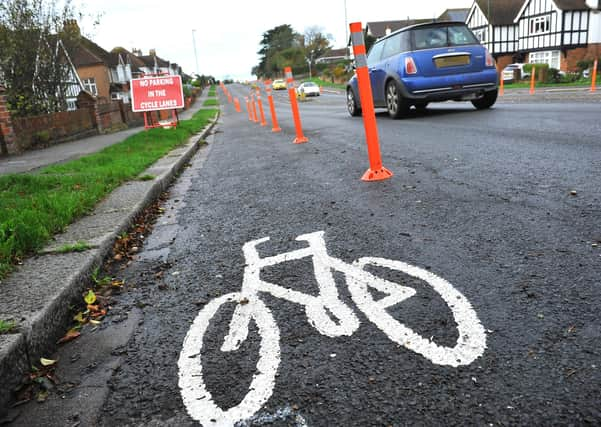Calls to reverse decision to scrap Shoreham pop-up cycle lane


The lane, in Upper Shoreham Road, was one of seven schemes opened in the summer by West Sussex County Council as part of government-funded efforts to increase cycling and move people away from public transport during lockdown.
During a scrutiny committee meeting on Wednesday (November 18), the closure was called in by Kevin Boram (Con, Shoreham South).
Advertisement
Hide AdAdvertisement
Hide AdMr Boram said the route was part of Adur District Council’s cycling and walking plan and the pop-up lane needed to be replaced rather than scrapped.
Pointing out that 2,300 cyclists has used the route during the first week in November alone, he said: “We need to allow time to replace the scheme with a permanent scheme suitable for all forms of transport users to deliver the government’s, the county and [Adur’s] sustainability, health and wellbeing policies.
“It is time to deliver. Shoreham can.”
Mr Boram also called for more time to consult with the public on the matter and suggested that further government money could be used to improve parking and provide a crossing over nearby Steyning Road.
Most of the committee supported the call-in, meaning Roger Elkins, cabinet member for highways and infrastructure, will be asked to reconsider his decision – though he is under no obligation to do so.
Advertisement
Hide AdAdvertisement
Hide AdHowever, they did not support a similar call-in for a pop-up lane in Chichester. despite a strong argument from Dr Kate O’Kelly (Lib Dem, Midhurst).
Data shared with the meeting showed the two-kilometre long lane, on the A286 ring-road had proved unpopular, particularly with motorists, with congestion and a perceived lack of use being the main concerns.
Dr O’Kelly spoke about the council having a ‘once in a generation’ opportunity to improve the area’s cycling and walking network along with the health and climate benefits that would bring.
While acknowledging that some of the pop-up lanes had not worked as well as had been hoped, she stressed the success of others and called for them to be improved rather than removed.
She added: “There’s no evidence that this real and pragmatic option was considered, let alone scrutinised.”